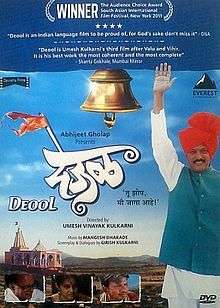Deool
| Deool | |
|---|---|
 Movie poster | |
| Directed by | Umesh Vinayak Kulkarni |
| Produced by | Abhijeet Gholap |
| Written by | Girish Pandurang Kulkarni |
| Screenplay by | Girish Pandurang Kulkarni |
| Starring |
Nana Patekar Dilip Prabhawalkar Girish Kulkarni Sonali Kulkarni Sharvani Pillai |
| Music by | Mangesh Dhakde |
| Cinematography | Sudhakar Reddy Yakkanti |
| Edited by | Abhijit Deshpande |
Production company |
Devisha Films |
Release dates |
(at Pusan International Film Festival, South Korea)
(in India) |
| Country | India |
| Language | Marathi |
Deool (Marathi: देऊळ, English: The Temple) is a 2011 Indian Marathi film directed by Umesh Vinayak Kulkarni and produced by Abhijeet Gholap. The film stars Girish Kulkarni, Nana Patekar, Dilip Prabhawalkar, Sharvani Pillai, Sonali Kulkarni in lead roles. The film is about the effect of globalization on India's small towns and the terrible state of Indian villages, with a political backdrop.
Deool won the 59th National Film Awards for Best Feature Film,[1] Best Actor (Girish Kulkarni) and Best Dialogue (Girish Kulkarni).[2]
The film also marks the debut of veteran Hindi film actor Naseeruddin Shah in Marathi film industry.[3]
Plot
Keshya is a village simpleton. One day, while sleeping under a tree after going in search of the village landlord's cow, he has hallucinations of Dutta (God) within the tree. He goes and tells a few people in the village including Vahini, the landlord's wife and Anna, an educated, city bred old man staying in the village. Some people rebuke him while some believe in what he says. The landlord, Bhau is disturbed by the developments. He is the unofficial head of the village though he has propped up a woman as the Sarpanch (village head). He has big political ambitions and is planning to build a hospital in the village under the guidance of Anna, which he can showcase of "development politics".
Cast
- Nana Patekar as Bhau Galande
- Dilip Prabhawalkar as Anna Kulkarni
- Sonali Kulkarni as Vahini
- Girish Kulkarni as Keshya
- Jyoti Subhash as Kanta, Keshya's Mother
- Jyoti Malshe as Pinky
- Atisha Naik as Sarpanch (Village head)
- Usha Nadkarni as Sarpanch's Mother in Law
- Kishor Kadam as Mahasangram
- Shrikant Yadav as Appa Galande
- Hrishikesh Joshi as Tommya (Jambuwant Rao)
- Shashank Shende as Ninety
- Sharvani Pillai
- Mayur Khandge as Yamdya
- Suhas Shirsat as Poytya
- Abhijit Khaire as Audience
- Vibhavari Deshpande as Poytya's Sister in Law
- Bhakti Ratnaparakhi as Appa Galande's wife
Guest Appearance
- Mohan Agashe as Aamdar Saheb
- Naseeruddin Shah as Dacoit
Release
Deool was scheduled to be released on 23 September 2011 but was later postponed to November.[4] It was shown in Busan International Film Festival, South Korea, New York's South Asian International Film Festival, the Abu Dhabi International Film Festival and MAMI in Mumbai,[5] and was released on 4 November 2011 nationwide.
Music
Music of Deool was composed by Mangesh Dhakade and lyrics were penned by Swanand Kirkire, Sudhir Moghe.[6]
| Track listing | |||
|---|---|---|---|
| No. | Title | Singer(s) | Length |
| 1. | "Deva Tula Shodhu Kutha" (Bhajan) | Shahir Devanand Mali | 02:53 |
| 2. | "Welcome Ho Raya Welcome" | Urmila Dhangar | 04:32 |
| 3. | "Phoda Datta Naam Taho" | Swanand Kirkire | 05:19 |
| 4. | "Tu Jhop Tujha Datta Jaga Aahe" | Swanand Kirkire | 02:47 |
Awards and recognition
Deool gathered positive reviews from critics on release. Daily News & Analysis (DNA) gave the film a 4 star rating out of 5 saying, "There’s too much going for Deool. It is an Indian language film to be proud of. For God’s sake, don’t miss it."[7]
The movie won maximum number of awards (3) at 59th National Film Awards in 2011.
- Citation: For its witty, satirical and penetrative account of the politics involved in the commercialization of religion in India. Through a wonderfully authentic depiction of village life, mentality and gesture, Deool has a social, religious and commercial sweep, even as it individualizes each of its characters and endows them with a language and space of their own. The film ironically shows the wholehearted acceptance of commodified and clamorous religiosity in a land plagued by all the serious problems the country faces today, and it does so with laughter that is only slightly tinged with cynicism.
- Citation: For his role as Kesha, the good hearted village simpleton, who inadvertently sets tumultuous events in motion, is circumspect and tenderhearted. Shorn of histrionics, his performance depends largely on his face and eyes to convey the multitudinous emotions in his mind which he cannot utter. He is controlled yet ingenuous, moving towards the beginnings of an understanding of the world around him, a move that transforms itself unselfconsciously into a spiritual quest.
- Citation: For its immensely varied and textured use of language that is both an authentic and an energetic reflection of the different sections of life shown in the film: the language of the village, of politicians, of the scholar and much else. His dialogues - robustly rustic yet influenced by urban vocabulary - is characteristic of the Indian scene today.
References
- ↑ "Vidya Balan wins National Award for 'The Dirty Picture'". Times of India. 7 Mar 2012. Retrieved 12 Mar 2012.
- ↑ "59th National Film Awards: Winners List". MSN entertainment. Retrieved 12 Mar 2012.
- ↑ "Naseeruddin Shah makes Marathi film debut in Deool". bollywoodhungama. Retrieved 5 November 2011.
- ↑ "Deool-release-date-postponed". maujmaja. Retrieved 5 November 2011.
- ↑ "'Deool' heads for international fests". TOI. 19 September 2011. Retrieved 5 November 2011.
- ↑ "Deool- Marathi Film review". marathimovieworld. Retrieved 5 November 2011.
- ↑ Chettiar, Blessy. "Review: For god's sake, don't miss Deool". DNA India. Retrieved 5 November 2011.
External links
- Deool at the Internet Movie Database